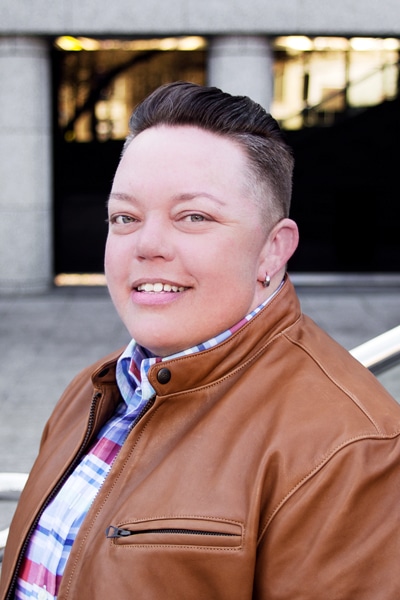Melissa Oberkfell was living a professional nightmare. She had a lengthy roster of credentials: an associate of applied science (AAS) degree in software development, a bachelor’s degree in business administration with a focus on operational strategy, a JD, an MBA, and a USPTO registration number. A highflier with plenty of pluck, she assumed that there was no world in which successful businesses wouldn’t be beating down her door to hire her.
“I submitted hundreds of applications,” Oberkfell remembers. “I had close to seventy-five different versions of my cover letter and just as many résumés, just trying to turn the cube a bit and highlight what I thought these companies might be looking for.”
Oberkfell’s story isn’t one that’s heard nearly enough. “The one thing I didn’t have was experience, but no one was willing to give it to me,” the lawyer says of the catch-22 professionals whose career paths don’t follow the “usual route” often find themselves in.

After an early, extensive career in IT, Oberkfell’s lack of a four-year degree was routinely named as the sole reason for her not moving up the ladder when the market took a downturn. She responded by amassing a string of initials at the end of her name that puts most alphabet soups to shame.
“I convinced myself, despite the fact that the market was bad, that my specific experience in technology would really lend itself nicely to that boots-on-the-ground, business-minded perspective of an in-house attorney,” the lawyer says. Then came the punchline.
“I kept hearing that my tech experience was great, but I didn’t have a four-year degree from Georgia Tech,” Oberkfell says, laughing. “I was told that I could have a JD from the worst law school in the country but would have gotten great offers if I had gotten my degree from a better-known university.”
It became so disheartening that Oberkfell started applying for paralegal and docketing clerk jobs, hoping she might be able to prove herself and rise in an organization. She was told she was overqualified.
Putting It All to Work
Fortunately, Oberkfell is the product of two driven parents. “Being bull-headed is just my foundation,” the lawyer says. “There just wasn’t anything that was going to stand in my way, and that includes hundreds of nos. I’m a problem-solver. I just had to figure it out.”
The first chance would come in the form of acting as GC for a small software company that could put Oberkfell’s patent abilities to work. And from there, the lawyer took off.
After a wide breadth of financial services partnership and legal experience, Oberkfell says fintech company Early Warning Services is the ideal culmination of a uniquely earned career trajectory. “I get to support a business that is exactly in my bailiwick and has enabled me to bring to bear just about everything I’ve ever dealt with,” the lawyer says. “I get to work down in the pit with crazy smart people; there are incredibly challenging problems to solve, and I get to work right alongside the team.”
When Oberkfell was introduced, it wasn’t just as a lawyer who had served as counsel across the table for the company. “My boss listed off all the things I’ve been able to do throughout my journey,” Oberkfell says. “It was amazing to hear it out loud and just know that yes, this is what I’ve done to get here, and this is how I can help.”
Rethinking “Experience”
Oberkfell wants her story, and her ultimate success as a fintech lawyer, to raise a larger issue: the struggle of lawyers with less traditional paths. “This is exactly the kind of thinking I’m hoping my story can help change,” says the now senior product counsel at Early Warning.
“We need to evolve how they think about what talent means and how someone might be valuable to their organization,” she continues. “I have people on my team who have had fantastically different careers. You might never think to hire them for the position they’re currently in, but they’re some of the most valuable members of their teams. A lot of skills people try to compartmentalize are so much more fungible.”
There is a happy ending to Oberkfell’s story, but it took far too long to get there. In speaking with her about her career journey, a clear pattern emerges—waiting for that one chance that would help the lawyer get on the path where she knew she belonged. The setbacks are a greatest hits playlist of what happens when checking the boxes is more valued than the cumulative experiences that have made a person who they are.
“The practice of law has such a storied past, but I find some of the ‘elite-ness’ of it pretty overrated,” the lawyer says, laughing, realizing she may be offending some with her bluntness. “The industry as a whole needs a shift of perspective so desperately.”
Not every lawyer is going to get virtually every degree available to live up to expectations, and not every lawyer is going to sit for hundreds of lunches filled with empty promises (“I had so many lunches that went nowhere, I probably don’t need to eat for the rest of my life”). Fortunately, Oberkfell hung in there. She hopes her struggle can serve as a wake-up call as to what exactly experience means—and who’s deciding.


